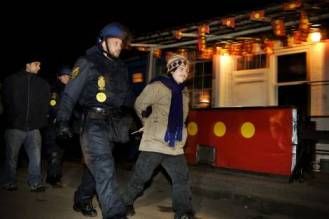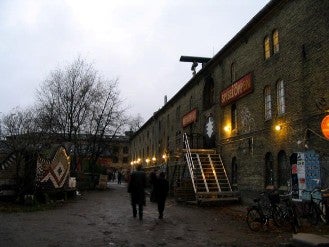
La página que intenta visitar sólo está disponible en inglés. ¡Disculpa!
The page you are about to visit is currently only available in English. Sorry!


Activists being arrested in Christiania last night.
Last night, developing countries and the African bloc countries grew increasingly frustrated with not being taken seriously at the COP15 Summit and almost boycotted the talks. The crisis was barely averted with an entreaty from Connie Hedegaard, the Climate Summit Minister from Denmark, who urged the countries to resume talks. Around the same time, the UN Secretary-General Ban Ki-moon scolded the climate negotiators for not making progress on a climate deal, saying, “Look in the mirror...Stop pointing fingers at others,” imploring negotiators to work more quickly and be more ambitious in trying to reach a serious binding agreement before Barack Obama arrived.
Also yesterday, the Bella Center metro station had to be closed down from too many people trying to reach the UN Climate Summit. Politiken reports that long lines have forced some had to wait up to six hours in the cold to get into the Bella Center summit meetings. It would appear that things aren't going well for the Climate Summit organizers and Rasmussen, the Danish Prime Minister who has hedged his hopes on the COP15 as bringing pride to the small Scandanavian country of Denmark.
While all this was going on, I made my way over to Christiania, a walled, squatted city-within-a-city in Copenhagen. A disused naval base in the 1960s, Christiania was squatted by hippies and for the last forty years has fought to remain a kind of autuonomous zone where the rules of the city outside no longer apply. Each of the 650 adults that live and work in the squatted houses, apartments, clubs and bars of Christiania pay into a common fund and agrees to live by a non-violent charter and attend weekly meetings and discussions. Drugs are acceptable within Christiania's borders, and one walks through Christiania seeing all manner of hash dealers set up displaying their wares, warily checking their flanks to see if the police are coming.

The streets of Christiania are filled with shops and bars.
In a packed, standing room only circus tent, a panel between Michael Hardt (who co-wrote 'Empire' with Antonio Negri), Naomi Klein (the author of 'Shock Doctrine' and 'No Logo' and a representative from the direct action group Climate Justice Action debated the tactics of the 'Reclaim Power' march that is due to march to the Bella Center on Wednesday. During the lively meeting in which the speakers implored the crowd to remain nonviolent in their direct action to enter the Bella Center, the speakers were interrupted several times by fiery demonstrators, angry with the police, and speaking out against the concept that they should have to remain nonviolent in their direct action. "I've never said this before in my life," Naomi Klein said, "but I think we should just make it clear that the violent people aren't with us in this particular event. I respect everyone's militancy and diversity of tactics, but I think in this particular situation it is important not to fight the cops." The speaker from Climate Justice Action said, "Don't look the cops in the eye. It's like with dogs. Look behind the cops. Look at the spaces in between the cops, places where you can try to slip through."
Climate Justice Action hopes that on Wednesday, by using direct action to enter the premises, they can join up with delegates from developing bloc and African countries who will be walking out in boycott of the official COP15 talks and form a 'People's Assembly' that will represent 'a new kind of politics' that addresses the needs of the developing world and the history of colonialism. Activists feel the official talks are slanted and absurd because the big, developed countries have all the power in the negotiations, and there is the sense that small countries are being pressured to 'seal the deal', no matter what kind of climate deal it is, and whether or not it is a good one.
The panel finished and received a standing ovation from the hundreds of people gathered in the tent. After, many people spoke to me of being inspired by the discussion, and it seemed to solidify many activists plans to attend the march on the 16th and attempt to 'reclaim power'. A party geared up in the tent, with people dancing, techno music and three-color animated projections of riot police and protests. After about a half hour, the music stopped and an announcement interrupted the dancing.
"Excuse me everybody, I just want to make an announcement. There is rioting and fires outside the walls of Christiania. The police are coming in and spraying tear gas. If you go outside, you may get teargassed. Some of the gas may come in, but you should be safe in here."
Outside the fenced corral of the circus tent area, hundreds of young people in black masks came rushing away from the sound of an explosion and the clouds of tear gas. Young people rushed to the bathrooms to wash the sting of the gas from their eyes and faces. If you've never felt tear gas--it burns the eyes, stings the face, and makes breathing difficult. Unable to leave the area, Ciara and I took refuge from the gas in a little tent set up for the alternative climate conference that looked like something straight out of 1001 Arabian Nights--you had to take your shoes off to go in and it was filled with people sitting on carpets drinking chai tea by little woodburning stove fires. The barrista in the tent, wearing nothing but a t-shirt, came outside, seeming accustomed to the chaos. "Oh, we get teargassed all the time now. Several times a year now. About 8 years ago, they really started being aggressive with Christiania. Just walk that way if you want to get out!" After a while, we decided to walk and try to find our way out. The village was dark and filled with marching phalanxes of police with flashlights and dogs, like something out of a World War II noir thriller--walking around, there was nothing but the stars, the moon, and the cobblestone streets with the police asking for papers and identification. After wandering around a bit and seeing big groups of people being arrested, we walked down a tree-lined dirt road past the back porches of Christiania's houses. There, we ran into one of Christiania's long-term residents, a gray-haired woman who invited us into her quaint home, which smelled of maple syrup, for a cup of tea. "Oh, the police are always here. There is always fires and tear gas. They don't like Christiania but can't kick us out, so they just make life hell for us here." The woman shook her head and sipped her tea. "I wish these young people wouldn't go out there and start fires and provoke the police...these houses here are all made of wood! They could burn down! It would be a shame..." She showed us a way out--walking towards the bright headlights of two police vans, we came out of the hallucionagenic, walled city of Christiania and back into the city of Copenhagen, and made our way back home. At the nights end, 200 were arrested and detained in Christiania, after the rioting and unrest, further fueling activist anger towards the police.